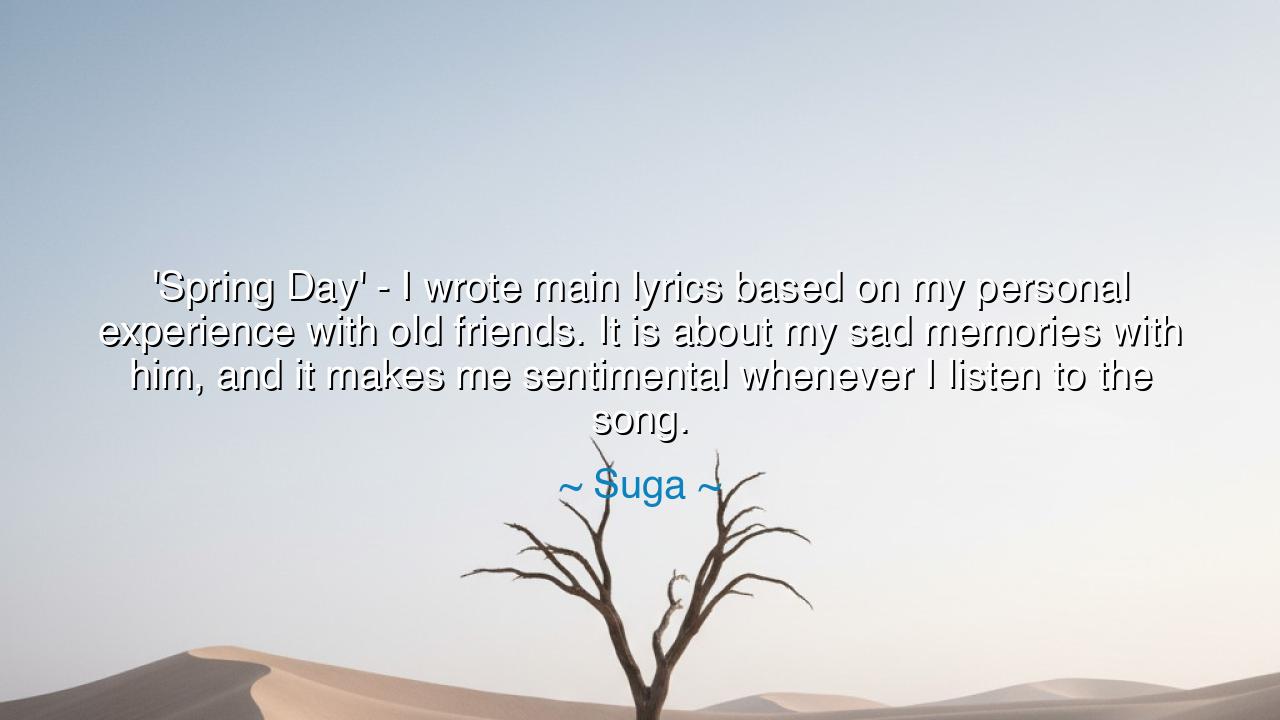
'Spring Day' - I wrote main lyrics based on my personal
'Spring Day' - I wrote main lyrics based on my personal experience with old friends. It is about my sad memories with him, and it makes me sentimental whenever I listen to the song.






Hear the words of Suga, spoken with quiet candor, unveiling the heart behind his creation: “‘Spring Day’—I wrote main lyrics based on my personal experience with old friends. It is about my sad memories with him, and it makes me sentimental whenever I listen to the song.” In this confession lies the truth of art—that from grief is born beauty, from memory is born music, and from sorrow comes a gift that reaches countless souls. The song is not merely a melody, but a vessel carrying the weight of longing, friendship, and loss.
The meaning of his words rests upon the universality of memory. All who live long enough will know the ache of distance, the sting of parting, the bittersweet recollection of times that cannot return. Suga transforms his sad memories into song, showing that pain unspoken festers, but pain expressed can become healing—not only for the artist, but for those who listen and find their own stories mirrored in the verses. Thus, the song is both personal and universal, a bridge between his heart and the hearts of strangers.
The ancients, too, honored this power of art to transmute grief. The Greek poet Homer, in the Iliad, did not shy away from sorrow; he sang of the grief of Achilles, who wept for Patroclus, his lost companion. Those ancient verses, filled with sadness, gave voice to every soldier and mourner who had ever felt the same. Just as Homer’s poetry became immortal through the honesty of sorrow, so too does “Spring Day” endure because it dares to hold grief in song.
History also gives us the story of Franz Schubert, who in his short life composed melodies steeped in longing and melancholy. His “Winterreise” was a journey of the soul through cold landscapes of despair, born of personal loneliness. Like Suga, he wove personal pain into music that outlived him, comforting and haunting generations. Their message is the same: the sentimental heart, though wounded, becomes the healer of others when it dares to sing.
Suga’s admission also speaks to the bond of friendship, for it is not only romantic love that leaves deep scars. To lose or drift apart from a friend is a sorrow often left unspoken, yet it cuts as deeply as any heartbreak. By giving voice to this kind of grief, he dignifies it, reminding us that friendships are sacred, and their absence leaves silence where laughter once resided. In naming these feelings, he grants others permission to mourn what they, too, have lost.
The lesson, O seeker, is clear: do not hide from sad memories, nor fear the sentimentality they bring. For memory, even when painful, is proof of love once lived, connection once shared. Rather than fleeing sorrow, let it remind you of the beauty of what was. And if the weight is too heavy, transform it—into music, into poetry, into conversation—so that grief becomes not an ending but a continuation of the bond in another form.
Practical is this counsel: keep alive the stories of those you miss. Speak their names, revisit the places you once walked together, let the emotions flow without shame. And if you can, create something—a song, a letter, a work of art—that holds your feelings, so that your sorrow may become light for someone else’s darkness. For when shared, pain loses its sting and becomes a thread that binds humanity together.
Thus, Suga’s words stand as both confession and teaching: “It is about my sad memories with him, and it makes me sentimental whenever I listen to the song.” From one man’s grief, millions have found comfort, reminding us that sorrow is not weakness but strength when transformed into creation. Let us, too, learn this art: to carry our sadness not as a burden, but as music for the world.






AAdministratorAdministrator
Welcome, honored guests. Please leave a comment, we will respond soon